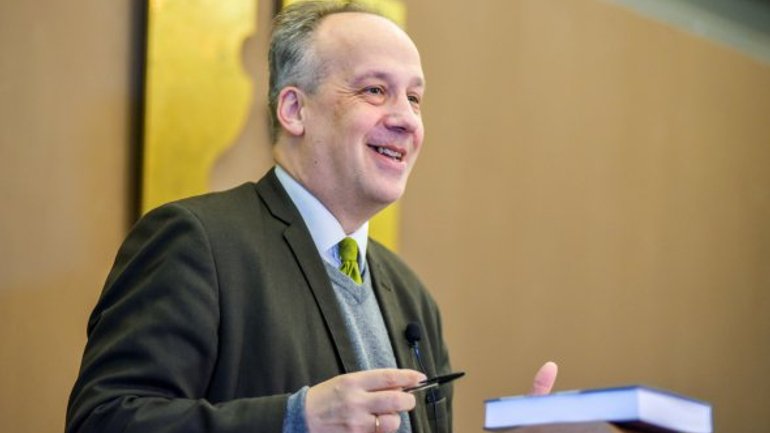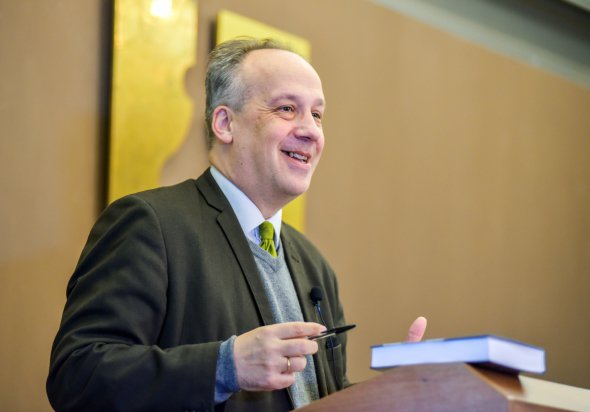“Is Patriarch Kirill responsible for deaths in Donbas?” – French historian Antoine Arjakovsky

The Ukrainian Orthodox Church (Moscow Patriarchate) is not well-known in the world because it is confused with the Russian Orthodox Church. It does not possess autocephaly, and therefore a face of its own, Antoine Arzhakovsky, a French historian, told an interview with Gazeta.ua.

- I wrote an integrated history of the Orthodox Church and about "Orthodoxy" in different senses, Antoine Arjakovsky comments on his religious bestseller "What is Orthodoxy?". It was published in France in 2013. Journalists talked to the author at the presentation of the Russian translation by "Dukh I Litera" publishing house.
To what extent is the concept of the “Russian world” logical for Universal Orthodoxy, and what is your attitude towards it?
- A person with a serious historical approach is aware that the definition of Orthodoxy through the “Russian world” is a classic ideology of “Moscow - the third Rome”. This ideology has caused many tragedies: as Nikolai Berdyaev wrote, as a result of the “Third Rome,” the 3rd International arose.
The tragedy is that we have seen no repentance for this ideology on the part of the Russian Orthodox Church. Therefore, the trouble comes back: the pseudo-theology that gives rise to the war and is the source of the non-recognition of the Ukrainian nation as one of the successors of Kyivan Rus. There is a mixture of memory and history, as if there is a single line from Kyiv to Moscow. This is nonsense, and it was characteristic of France. For centuries, the Germans and French fought against each other because they sought to be the only descendants of Charlemagne. This led to two world wars. Through false theology and ideology, the wars are waged.
That is, the world Orthodoxy can easily do without the “Russian world”?
- Of course! This is not characteristic of true Orthodoxy at all.
What is the role of the Russian Orthodox Church in the war in Donbas?
“The only thing I know is that Patriarch Kirill did not condemn the annexation of the Crimea and this war. It is not clear to me. In my opinion, the role of the patriarch is to condemn rulers who violate international law. Unfortunately, this is not about Kirill, and he is responsible for the tragedy and death of people in Donbas.
How should the Metropolitan of the UOC MP Onufriy act in a situation where almost all the priests of Luhansk and especially the Crimean dioceses began to serve the occupation regime?
- The Church is a reality broader than a nation. It must use the fact that there are different nations and establish peace. However, how can this be done? One should not hide and say: “Politics is not our business.” Conversely, dialogue between the contending parties shall be promoted. One should not avoid politics to create conditions for reconciliation.
In Zaporizhzhya, in early January, the priest of the Moscow Patriarchate refused to serve a burial service for the deceased child, as he was baptized in the church of the Kyiv Patriarchate. How does this situation characterize Ukrainian Orthodoxy?
- It speaks of the need for reform of Orthodoxy. This is a tragedy when there is no mutual recognition of baptism.
It is a great joy to me, for example, that representatives of the Greek Catholic Church recognize baptism, performed in any Orthodox Church - including the UOC of the Kyiv Patriarchate. On the contrary, the UOC-KP recognizes the Greek-Catholic baptism. This is the most authentic Orthodox understanding of the sacrament.
And what happened in Zaporizhzhya is a real scandal. It is imperative that representatives of the UOC-Moscow Patriarchate withdraw from this dry canonism.
The canons have no meaning if there is no spirit of love.
What is the reputation of the UOC MP in the West?
- The Ukrainian Orthodox Church (Moscow Patriarchate) is not well-known in the world because it is confused with the Russian Orthodox Church. It does not possess autocephaly, and therefore a face of its own. It does not help to establish peace between Russia and Ukraine. If there was only a local church that would unite different branches of Ukrainian Orthodoxy, then it would be easier to realize the existence of a Ukrainian state capable of friendship with Moscow, with Constantinople, and with Rome.
By the way, this was the project of Petro Mohyla and in the West they still remember him. And hardly anyone ever knows Onyfriy.
Antoine Arjakovsky is a French historian, philosopher and theologian. He graduated from the Historical Faculty of the Sorbonne and the Paris Higher School of Social Sciences. In the 1990s, he chaired the French University College at Mikhail Lomonosov Moscow State University. He was an attaché for culture and education of the French Embassy in Ukraine, co-director of the French Cultural Center. In 2004, he founded the Institute of Ecumenical Studies at the Ukrainian Catholic University and held this post until 2011. Since then he was director of research at the Bernardine College in Paris. In January 2014, he made a statement in which he criticized the Russian Orthodox Church for condemning Euromaidan. Last December, along with 11 other activists, he joined an open letter calling for the withdrawal of the license on the TV channel RT France through “sowing discord and weakening democracy”. In 2015, the book “Dissent of Ukraine with Russia: A strategy to pull out of a nose dive”. He is the author of a total of 9 books on Orthodoxy, the relationship between Ukraine and the Russian Federation, the ecumenical movement - for cooperation and mutual understanding between Christians of different denominations









